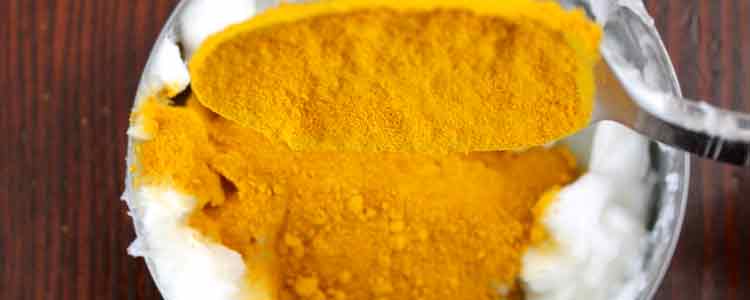
Acne affects countless people throughout the world. It’s a common problem, particularly among teenagers. Acne normally shows up in the skin of the torso, back, and face. These areas of the body hold the highest numbers of sebaceous glands. Acne develops whenever these glands become contaminated or over-stimulated. Acne may result from hormones, bacteria, drugs, and the blockage of follicles. You can treat acne using powerful compound lotions you can buy in the pharmacy, but these items can irritate the skin and cause swelling in many individuals. Luckily, there are alternative options you could make use of, like the herb turmeric. This powerful spice contains an ingredient called curcumin that has antioxidant and anti-inflammatory properties.
Why Try Turmeric for Acne?
While studies looking at the medical benefits of turmeric are still relatively new, they are quite promising. Thus far, studies are showing that the herb contains antifungal and antibacterial actions. It is these sorts of things would help one to battle acne.
The ingredient in turmeric that grants it these potential health benefits is curcumin, and that is also the compound that gives the herb its yellowish color. In both animal and invitro studies curcumin was demonstrated to possess antioxidant, anti-inflammatory, antitumor, and a plethora of other health-related qualities. In short, the health benefits of turmeric are quite numerous. Being anti-inflammatory, acne should be helped by curcumin by decreasing discomfort and redness due to irritation.
Simple Recipe for a Turmeric Mask for Acne
Get 4 tablespoons of turmeric powder, add 1 tbs of milk and 4 tbsp of raw honey. Until it becomes a smooth paste stir this combination in a clean bowl. Keep this blend within the fridge to cool. One other option for a mix would be to mix 8 tbsp of the powder of turmeric with 5tbsp of sesame oil. Mix them the same as above and keep in the fridge as well.
The remainder of the treatment measures below are exactly the same regardless of which of the above mixtures you choose to use.
Before using the above mask make sure that you enjoy a long warm to hot shower to soften the skin using a light shower gel or bath soap. Don’t use anything that contains glycerine, is antibacterial, or is medicated as they may dry up the skin. Within the shower, get a washcloth and soak it. Use the washcloth on the affected areas for at least five minutes. Now pat the skin dry.
Use your fingers and put the turmeric paste onto your dry, soft-skin, using a gentle massaging movement. Do this for about 10 minutes and allow it to dry while you sleep. The turmeric will dry and be stiff as a mask in the morning. Have a shower when you get up to get rid of the turmeric paste each day. You will discover that your skin will be a bit yellow from this. This doesn’t last long, though, and certainly will disappear in about a week. Nevertheless, if you like you can immediately get rid of the color with a facial toner. Just softly rub your skin with a facial toner-soaked cotton ball.
Using Turmeric Supplements for Your Acne
There are some things that you should remember if you would like to make use of turmeric supplements for your acne, or even just for its general wellness functions. Piperine (a compound found in black pepper) assists in the absorption of turmeric in the bloodstream. Some turmeric or curcumin supplements can include piperine for this reason. Often you’ll see turmeric supplements marketed as curcumin, the active ingredient in the herb.
Recommended dosages change often based on quality and quantity within any given supplement. Try getting 2-3 500-mg capsules per day, determined by how the body tolerates it. Some folks have much more. You can also open up the pill capsules and use the powder in a mix for the above mask.
Warnings When Using Turmeric
There aren’t many common side effects related to turmeric. The most typical ones are diarrhea, nausea, and other small issues. Be careful not to spill it as it stains. It will stain clothes, sheets, and anything else. Use older bedsheets and old clothing when you use this herb topically.
There’s some worry that the curcumin in turmeric may present dangers for pregnant women. There’s hardly any evidence one way or another to support this claim, but it’s been suggested that curcumin might arouse the uterus in pregnant women and may result in miscarriages, and as such anyone pregnant should avoid this herb.
In addition, curcumin is known to inhibit blood clotting, therefore, avoid taking any turmeric 2-3 weeks just before any major surgery or in the event that you’re taking any blood thinners.
Turmeric is really a great herbal treatment in the fight against acne. Using these easy-to-make home turmeric masks, you can get rid of the acne in the comfort of your home. These facial masks are inexpensive, easy to create, and many elements can be found in your kitchen or may be procured very easily. Before beginning, I would just suggest that you perform a patch test before you begin utilizing it widely and use authentic, high-quality turmeric for optimal results.

Good article, and there was also a study where turmeric reduced oily skin by 24.76%. That occurred after three months of daily application. That’s a huge decrease, and think of the benefits for clogged pores and acne. How it works is yet to be determined but turmeric contains so many antioxidants and phytonutrients that anything could be responsible.